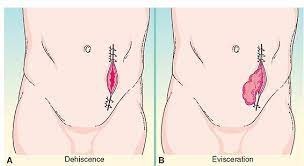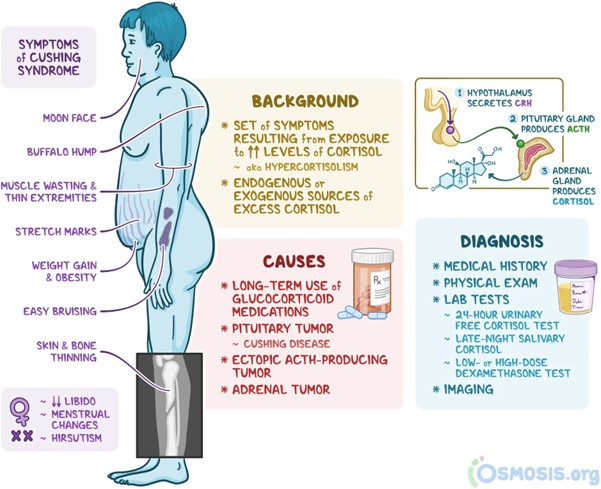The nurse is assessing a patient's postoperative wound and finds it has separated from the suture line with extrusion of the intestine through the opening. How does the nurse document this finding?
Wound evisceration
Wound dehiscence
Wound infection
Wound tunneling
The Correct Answer is A
Wound evisceration refers to the protrusion of internal organs or tissues through an open wound. In this case, with the separation of the wound and extrusion of the intestine through the opening, it is a clear indication of wound evisceration. It is a surgical emergency that requires immediate medical attention.
Wound dehiscence, on the other hand, refers to the separation or opening of a previously closed surgical incision or wound. It does not involve the extrusion of internal organs or tissues.

Wound infection refers to the presence of infectious microorganisms in the wound, leading to inflammation and other signs of infection.
Wound tunneling refers to the formation of narrow channels or tunnels within the wound, often caused by improper wound healing or infection.
Nursing Test Bank
Naxlex Comprehensive Predictor Exams
Related Questions
Correct Answer is B
Explanation
Cushing's syndrome is a disorder characterized by excessive production or prolonged exposure to high levels of glucocorticoids, particularly cortisol. This can occur due to various reasons, such as the use of corticosteroid medications or overproduction of cortisol by the adrenal glands. Elevated glucocorticoid levels result in a variety of clinical manifestations associated with Cushing's syndrome, including weight gain, central obesity, muscle wasting, thinning of the skin, easy bruising, and impaired glucose metabolism.
It's important to note that Cushing's syndrome can have different underlying causes, such as adrenal tumors, pituitary tumors, or ectopic ACTH production. Regardless of the cause, the common feature in Cushing's syndrome is the excessive glucocorticoid levels, which contribute to the signs and symptoms of the condition.

Correct Answer is D
Explanation
The nurse should inform the client that a common side effect of Lisinopril, an ACE inhibitor, is a chronic dry cough. ACE inhibitors can cause irritation in the respiratory tract, leading to a persistent cough. It is important for the client to be aware of this side effect and report it to their healthcare provider if it becomes bothersome.
Whether you are a student looking to ace your exams or a practicing nurse seeking to enhance your expertise , our nursing education contents will empower you with the confidence and competence to make a difference in the lives of patients and become a respected leader in the healthcare field.
Visit Naxlex, invest in your future and unlock endless possibilities with our unparalleled nursing education contents today
Report Wrong Answer on the Current Question
Do you disagree with the answer? If yes, what is your expected answer? Explain.
Kindly be descriptive with the issue you are facing.
